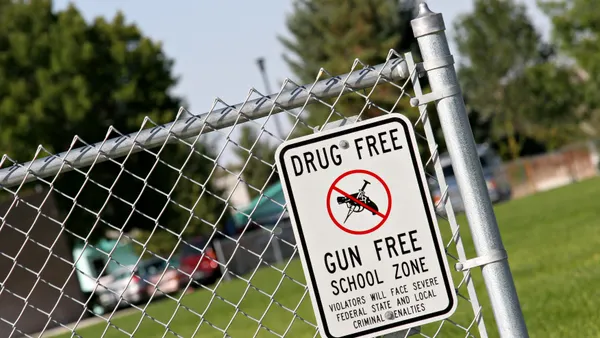Dive Brief:
-
The U.S. Department of Education on Monday said Arizona's Kyrene School District #28 violated a student's civil rights when it failed to address ongoing antisemitic harassment of the student by her peers. According to the Office for Civil Rights, the student who filed a complaint was in a "hostile environment" that included five months of harassment in school and on social media by nine other students.
-
According to OCR, the student was subjected to antisemitic slurs and disparagement and jokes about her Jewish heritage. Documents from the department show the student said the harassment resulted in her being absent from school, eventually being home-schooled, falling behind on academics, transferring to another district, not qualifying for an honors course and ending up taking remedial classes.
-
The OCR finding requires the district, among other remedies, to reimburse the student for tutoring expenses, offer her 10 hours of career counseling and train school staff on race and ethnic discrimination.
Dive Insight:
The announcement comes as the department plans to issue a proposed rule to amend its Title VI regulations — which currently protect against discrimination based on race, color or national origin — to address harassment and other discrimination based on shared ancestry or ethnic characteristics.
"In this area, OCR has received complaints of harassment and assaults directed at Jewish, Muslim, Hindu and other students based on their shared ancestry or ethnicity," according to the department.
Interpreting Title VI to include protections against shared ancestry or ethnic characteristics is not unusual, said Richard Cole, a Boston-based civil rights attorney and consultant for K-12 schools who regularly trains district personnel on equity and school climate.
"So this is not kind of a novel adoption," Cole said. But he said it could be an opportunity for the department to provide clarification on Title VI. "It is always helpful for school folks to have practical guidance about these very difficult, challenging issues."
In 2021, the Anti-Defamation League counted 331 antisemitic incidents at non-Jewish K-12 schools, up 106% from a historic low of 161 in 2020. Of the 331 incidents in 2021, some 178 were harassment. Another 152 were incidents of vandalism, and one was an assault.
In a 2018 report, the organization found significantly increased antisemitic incidents in schools partly contributed to the 57% rise in such incidents overall in 2017 from the previous year.
The 2021 report suggested the actual number of antisemitic incidents in K-12 schools was likely significantly higher than the reported data "given the insidious nature of bullying, compounded by the fact that many children may not feel empowered to report their experiences."
In the Arizona case, OCR found "the harassment the student experienced and the district’s failure to provide the student with a safe school environment caused her to suffer significant and enduring academic and emotional harm." In addition, OCR said the harassment was schoolwide.
“As we see a distressing rise in reports of anti-Semitism on campuses across the country, I commend Kyrene School District #28 for committing today to take essential steps to ensure that no other students will have to suffer anti-Semitic harassment or other harassment based on their shared ancestry,” said Assistant Secretary for Civil Rights Catherine Lhamon in a statement.
Notably, Cole said, the resolution agreement includes financial consequences for the district, which must offer reimbursement to the student for tutoring, counseling and other expenses the student incurred as a result of the antisemitic harassment. This could include transportation and book expenses, for example, said Cole.
"Financial consequence has been shown to have a deterrent effect," said Cole. "I think it does send an important message to school districts that … you will incur some potentially significant costs if you fail to follow federal civil rights laws."
Cole suggested that districts hoping to avoid similar cases should thoroughly train staff on student civil rights and reporting requirements, systematically collect data to search for patterns, have robust reporting systems and identify barriers to reporting, and conduct needs assessment for their schools.
"This requires a really holistic approach," Cole said. "There's a huge amount you need to do in order to change the climate and culture of a school. It can be done."















